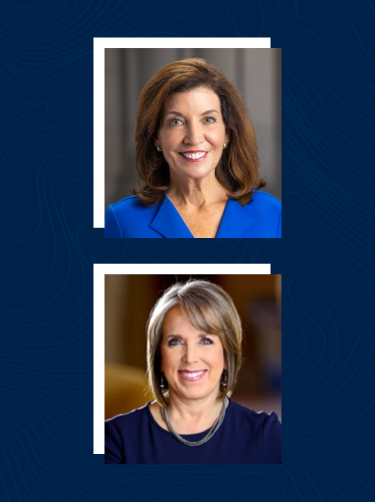Home / U.S. Climate Alliance Co-Chairs, Govs. Hochul and Lujan Grisham, Issue Statements on Presidential Election

WASHINGTON, D.C. — Today, the co-chairs of the U.S. Climate Alliance – New York Governor Kathy Hochul and New Mexico Governor Michelle Lujan Grisham – issued the following statements after the election of President-elect Donald J. Trump:
“The New York climate agenda doesn’t pause for elections,” said Alliance co-chair New York Governor Hochul. “Since taking office, I have implemented some of the nation’s strongest actions on climate, and make no mistake, we’ll continue leading the transition to a zero carbon future no matter who is in the White House. The U.S. Climate Alliance and its governors filled the void of leadership during President-elect Trump’s first term and Americans can be assured we’re prepared to fill it again. Together, we’ll tap every ounce of our experience and authority to protect America’s progress and press forward.”
“We’re not alone in this fight – we stand shoulder-to-shoulder with hundreds of cities, Tribes, businesses, and institutions that are fiercely committed to protecting our climate and delivering a better, healthier future for America,” said Alliance co-chair New Mexico Governor Lujan Grisham. “Governors have a decades-long track record of advancing innovative, effective climate solutions and we won’t be deterred by the result of this or any other election. No matter the obstacles, our commitment will not waver, and our progress will not be stopped.”
Through increasingly bold and ambitious climate action over the past four years, America has made historic gains, created millions of good-paying jobs, and invested billions of dollars in communities across the country. The U.S. Climate Alliance’s commitment to protecting this progress remains resolute.
The Alliance is a bipartisan coalition of 24 governors – representing nearly 55% of the U.S. population and 60% of the U.S. economy – all committed to securing America’s net-zero future through state-led, high-impact climate action. Since its creation in 2017, the coalition has been a cross-cutting, consistent source of leadership to uphold U.S. climate action both domestically and abroad. Whatever headwinds lie ahead, Alliance governors are up to the task and well-positioned to continue leading the charge.
Next week, the Alliance will lead a delegation of top state leaders to the UN Climate Change Conference in Baku, Azerbaijan. Together, the delegation will strongly affirm America’s sustained commitment to working with the global community to achieve the goals of the Paris Agreement.
Launched in 2017 by the governors of Washington, New York, and California to help fill the void left by the U.S. federal government’s withdrawal from the Paris Agreement, the Alliance has grown to include 24 governors from across the U.S. representing approximately 60 percent of the U.S. economy and 55 percent of the U.S. population. Governors in the Alliance have pledged to collectively reduce net greenhouse gas emissions by at least 26-28 percent by 2025, 50-52 percent by 2030, and 61-66 percent by 2035, all below 2005 levels, and collectively achieve overall net-zero greenhouse gas emissions as soon as practicable, and no later than 2050.
The Alliance’s states and territories continue to advance innovative and impactful climate solutions to grow the economy, create jobs, and protect public health, and have a long record of action and results. In fact, the latest data shows that as of 2023, the Alliance has reduced its collective net greenhouse gas emissions by 24 percent below 2005 levels, while increasing collective GDP by 34 percent, and is on track to meet its near-term climate goal of reducing collective greenhouse gas emissions 26 percent below 2005 levels by 2025.
###